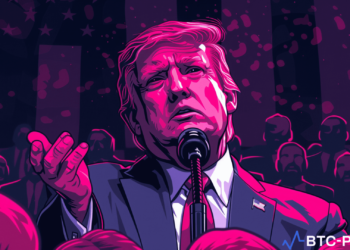Crypto regulation has been a hot topic for years, with enthusiasts touting the technology’s potential to revolutionize industries ranging from finance to healthcare being curbed by excessive regulations. Furthermore, a recent push by US lawmakers to tighten regulations on the crypto industry has some experts concerned that the country’s national security could be compromised.
🗽 Choking off the U.S. crypto industry could ultimately hurt national security, argues Coinbase’s @iampaulgrewal.
Listen now: https://t.co/zUOwSapGKo pic.twitter.com/Z0nEdUeznY
— Laura Shin (@laurashin) February 21, 2023
According to the Chief Legal Officer at Coinbase, Paul Grewal, who specializes in crypto law, choking the crypto industry in the United States could have severe consequences for the country’s ability to compete on a global scale. “If the United States continues to move in the direction of choking crypto, then it’s going to fall behind other countries and would most likely have to spend more trying to gain control back if it loses its hold on crypto,” Grewal told Unchain in a recent interview.
Grewal’s concerns are not unfounded. The US government’s crackdown on crypto has already driven some companies to move their operations overseas, where regulations are less strict.
Grewal’s concerns are shared by many in the cryptocurrency community, who fear that the US government’s efforts to crack down on crypto could stifle innovation and push the industry overseas. “We need to strike a balance between regulation and innovation,” Grewal said. There’s a need to create a regulatory environment that fosters innovation while protecting consumers and preventing illegal activities without choking them.
While it’s important for the US government to regulate the crypto industry, it’s equally important to do so in a way that doesn’t stifle innovation or compromise national security. This will require a delicate balancing act, as regulators must strike a balance between protecting consumers and preventing illegal activities, while also allowing the industry to continue to evolve and innovate.
Most crypto enthusiasts believe that the key to striking this balance is to work closely with industry stakeholders to develop regulations that are both effective and practical. Regulators need to work with the industry to develop regulations that are not counterproductive, and any regulations put in place should be grounded in reality and not just based on fears or misconceptions about the industry.
Ultimately, the success of the cryptocurrency industry will depend on the ability of regulators and industry stakeholders to work together to create a regulatory environment that fosters innovation while still protecting consumers and preventing illegal activities. If the US government can strike this balance, then the country could continue to be a leader in the development of this exciting and rapidly evolving industry.
However, if the government’s efforts to crack down on crypto continue to push companies overseas, or if regulations become too burdensome for new entrants, then the US risks falling behind other countries in the race for dominance.










